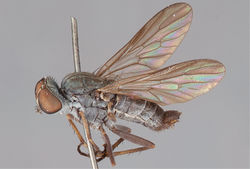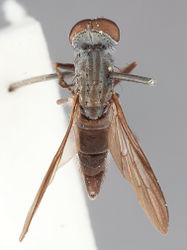Manestella nubis
| Notice: | This page is derived from the original publication listed below, whose author(s) should always be credited. Further contributors may edit and improve the content of this page and, consequently, need to be credited as well (see page history). Any assessment of factual correctness requires a careful review of the original article as well as of subsequent contributions.
If you are uncertain whether your planned contribution is correct or not, we suggest that you use the associated discussion page instead of editing the page directly. This page should be cited as follows (rationale):
Citation formats to copy and paste
BibTeX: @article{Winterton2012ZooKeys240, RIS/ Endnote: TY - JOUR Wikipedia/ Citizendium: <ref name="Winterton2012ZooKeys240">{{Citation See also the citation download page at the journal. |
Ordo: Diptera
Familia: Therevidae
Genus: Manestella
Name
Manestella nubis Winterton & Lambkin, 2012 sp. n. – Wikispecies link – ZooBank link – Pensoft Profile
Type material
Holotype male, AUSTRALIA: Queensland: Carnarvon National Park, Mount Moffatt Section, Headquarters (site 12), [-25.022, 147.954], 740m, 17.xi.1995, D. K. Yeates (MEI_030881, T174964, QM).
Diagnosis
Wing uniform infuscate; male frontal setae minute; male frons flat in profile; single row of postocular setae adjacent to ocellar tubercle in male; femora brown; male abdomen without silver velutum; triangular ventromedial projection absent on gonocoxites, velutum patch absent; distiphallus extending ventrally well beyond gonocoxites.
Description
Body length= 3.5 mm (male). Head. Frontal pubescence silver-grey with dark brown markings, frons profile flat, frontal markings as narrow brown medial stripe and suffuse spot above antennal base, patch of short setae above antenna, shorter than setae on scape, setae dark; male frons width at narrowest point narrower than anterior ocellus but not contiguous; male postocular setae as a single row immediately laterad of ocellar tubercle, additional setae irregularly arranged laterally; occipital pubescence grey, narrow brown stripe medially; genal setae white, short and curved anteriorly; antenna scape shorter than flagellum with dark setae, flagellum brown. Thorax. Scutal pubescence grey with brown markings, two dark medial stripes anteriorly joining posteriorly, lateral stripes broken to tessellate (pattern diffuse); scattered dark setae, denser anteriorly; katatergite setae uniformly pale; anepisternum uniform grey pubescent; coxae dark, overlain with silver-grey pubescence; coxal setae mostly pale; femora dark grey-brown, apices paler, vestiture short dark setae, admixed with longer pale setae; tibiae yellow, dark grey-brown apically; tarsi dark yellow with brown apices, distal segments completely dark; wing uniform smoky infuscate; scutal chaetotaxy(pairs) np, 3; sa, 1; pa, 1; dc, 4; sc, 1. Abdomen. Base colour dark brown; overlain with brown pubescence dorsally, grey pubescent laterally, without silver velutum on tergites, vestiture mostly as elongate pale setae, denser laterally; terminalia brown. Male genitalia. Gonocoxite without triangular medial process, outer gonocoxal process relatively elongate, spatulate distally, gonocoxite pubescence barely evident, without velutum patch ventromedially; distiphallus elongate, curved ventrally beyond gonocoxite.
Comments
Manestella nubis sp. n. is only known from a single male specimen from Queensland. This species is distinguished by the flat male frons, uniformly infuscate wings, and distiphallus projecting ventrally beyond gonocoxites.
Etymology
The specific epithet is the Latin nubes, smoke; referring to the infuscate wings.
Original Description
- Winterton, S; Lambkin, C; 2012: New Australian stiletto flies: revision of Manestella Metz and description of Medomega gen. n. (Diptera, Therevidae, Agapophytinae) ZooKeys, 240: 1-119. doi
Images
|

